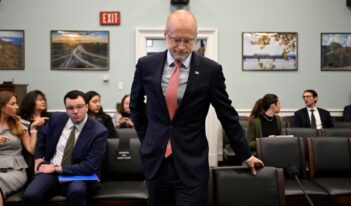
Commission plans to increase average Internet speeds for consumers throughout the country.
Earlier this week, the Federal Communications Commission (FCC) released a new plan to fulfill a Congressional mandate that all Americans have “access to broadband capability.” The plan is intended to increase average Internet speeds in 100 million homes, release large amounts of the broadcast spectrum to mobile Internet, and increase competition among Internet providers.
These are ambitious goals. According to the Los Angeles Times, the new download speeds called for under the plan would be twenty times faster than what is available to most consumers today.
The plan cannot be implemented solely by the FCC. Although the FCC does have authority to use funds to increase broadband access, it cannot auction off parts of the broadcast spectrum without authorization from Congress. The plan calls for auctioning off parts of the spectrum to allow for greater use of mobile broadband networks. Mobile broadband use has already greatly increased, and additional spectrum allocation is essential to continued network expansion and innovation.
The FCC claims that much of the existing spectrum is now poorly allocated among broadcasters. Of course, auctioning off space is likely to prove controversial, as it will raise competitiveness concerns by broadcast television and radio providers. Already the National Association of Broadcasters released a statement that the broadcast spectrum is currently allocated in the best possible way, saying “[a]s a one-to-many transmission medium, broadcasters are ready to make the case that we are far and away the most efficient users of spectrum in today’s communications marketplace.”
New wireless networks made possible by auctioning would provide the main source of competition to wireline broadband networks, such as cable or fiber optic networks. The FCC thinks that encouraging more wireless networks would be better than requiring a wireline network to rent out broadband to competitors, which is the preferred practice in other countries. Wireless competition, however, may not prove to be as effective as requiring shared lines. The Economist describes wireless as “more a complement than a competitor” to wireline services.
The FCC’s Broadband Plan implicates the controversy around network neutrality, the concept that Internet service providers should not be allowed to prioritize the transmission of data over their networks. Net neutrality means that providers cannot charge extra for some users or allow some services to run faster than others. Its advocates worry that without a neutrality requirement ISPs could block or slow access to sites or services that they views as competitors.
The new Broadband Plan does not specifically mention net neutrality, but it seems likely it would be easier to achieve the Plan’s objective of increasing speed if Internet service providers could manage different uses rather than having to maintain strict neutrality.
As Professor Christopher Yoo of the Penn Program on Regulation has noted, a net neutrality approach would necessitate building bigger pipes, and not necessarily using them better. Instead of insisting on neutrality, Professor Yoo would put data prioritization in customers’ control. If data transmission were based on how important high speed is to customers, this could advance the Broadband Plan’s objective without the need for as drastic an upgrade to the existing system.
Professor Gerald Faulhaber, also with PPR, agrees that network neutrality is misguided. He has offered an alternative plan that would focus on creating a network environment that is rich in customer choice. Part of his plan would, like the FCC’s plan, increase the amount of broadcast spectrum available. Professor Faulhaber argues that the goal should be to reduce entry costs for new broadband providers and then to require greater transparency by all providers. He argues against regulatory mandates, such as those that would require unbundling, as these will only limit investment in higher-speed Internet.



